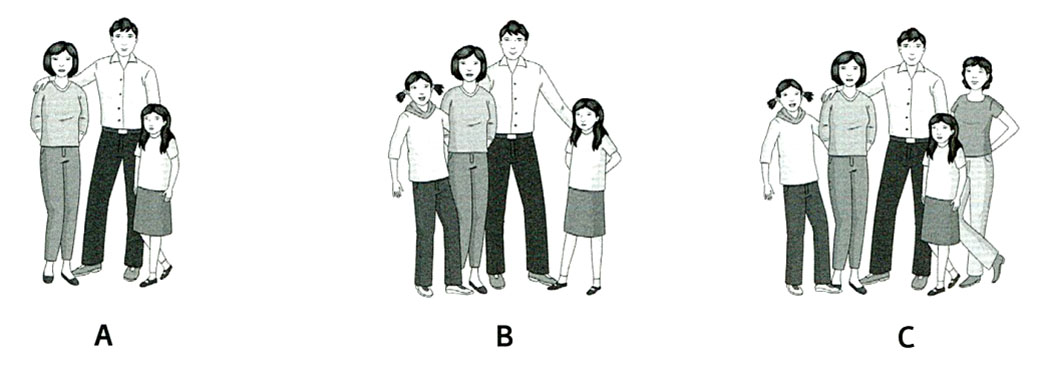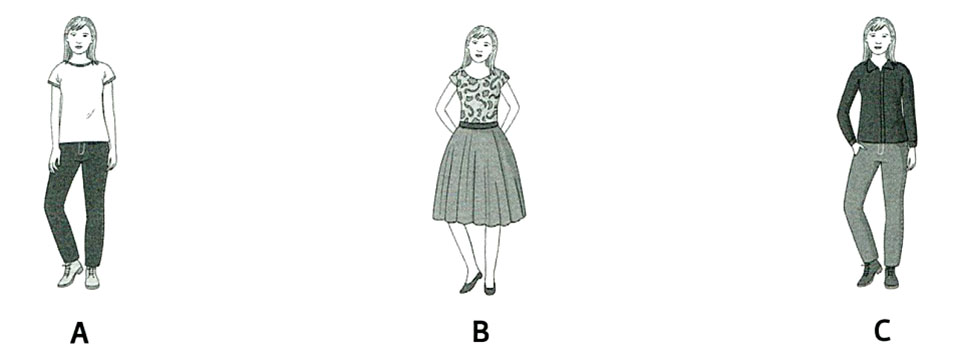Listening Part 1
Questions 1-7
For each question, choose the correct answer.
1 What date does the woman’s holiday begin?

2 Where did the boy first find out about the festival?

3 What does the boy ask the girl to buy?

4 How do you get to the bookshop?

5 How many people live next door?

6 Where are they going on holiday?

7 What does the girl decide to wear to the concert?

Answer & Audioscript
1 C 2 B 3 A 4 C 5 B 6 B 7 B
Audioscripts
1 What date does the woman’s holiday begin?
Man: Hi! Are you all ready for your holiday? I heard that you’re going next Friday!
Woman: On the 18th? No. We were planning to leave then, but my cousin isn’t free that weekend, so we’re going the following Friday now.
Man: Oh! That’ll be the 25th, the day before I leave, too. I can’t wait to get away. How long are you going for?
Woman: Only ten days, but I’m really looking forward to it.
2 Where did the boy first find out about the festival?
Boy: Look at this! The City Festival’s on next weekend. Do you want to go?
Girl: Oh yes, I really want to go, but I didn’t know it was on so soon. There was an ad on TV the other day, but I didn’t notice the dates.
Boy: Well, I only realized it was on because my dad had last Sunday’s newspaper. Here, have a look at the website and we can decide what to get tickets for.
3 What does the boy ask the girl to buy?
Girl: I’m going to the shops to get some milk. Do you want me to get you anything?
Boy: Yeah, can you get me some eggs, please? I’m going to make a cake for Mum’s birthday.
Girl: No problem. Shall I get some flour, too?
Boy: Don’t worry, we’ve got plenty in the cupboard. I was thinking of doing something different to my usual chocolate cake. Could you get a lemon and I’ll try this new recipe? It looks very tasty.
4 How do you get to the bookshop?
Woman: The bookshop? Oh yes, it’s just off Bridge Street, next to the museum. Go straight across this roundabout and then after about 500 metres you’ll have to turn right at the crossroads. Sorry, I mean left, into Bridge Street. Go down the road a little way and you’ll see the museum on the corner. It’s a big building with columns at the entrance. The bookshop is down a small ride turning beside the museum – you can’t miss it.
5 How many people live next door?
Boy: Hi! Where have you been?
Girl: Oh, hi! I’ve just been chatting with our new neighbours. The mum and dad seem really nice. And there’s a girl called Monica who’s about my age. Maybe we’ll be able to hang out together.
Boy: Oh! I thought I saw an older girl there yesterday.
Girl: Actually, Monica’s got two older sisters, but one’s already left home. Anyway, you should call in and say hi!
6 Where are they going on holiday?
Boy: So, are you looking forward to going on holiday with your parents?
Girl: No. We’re still arguing about it! Dad wants to rent this quiet house in the countryside, but Mum says it’s way too far from the coast. She’s seen these great apartments online; they’re right beside the beach.
Boy: Those apartments sound pretty amazing to me. Is that where you’d like to go as well?
Girl: No way. I’d much prefer a city break! There are so many fun things you can do in a new city, and we could rent a really cool flat in the city centre, you know? But Mum has won this time. She really loves the seaside.
7 What does the girl decide to wear to the concert?
Girl: Well, it’s a shame you can’t come to the concert tonight. I’ll have to go on my own. I was planning to wear those dark jeans with a black shirt. Do you think that’s smart enough?
Boy: How would I know? If you want to look smarter, there’s that blue dress you got from the market?
Girl: Brilliant idea! Much better than trousers.
Boy: Well, whatever you think, but I’m sure it would be fine to just wear jeans and a T-shirt if you wanted. It’s only a small concert.
Listening Part 2
Questions 8-13
For each question, choose the correct answer.
8 You will hear two friends talking about football training.
The boy feels that
A he’s as fit as the others.
B he’s let everyone down.
C he’ll improve over time.
9 You will hear two friends talking about travelling to and from school.
What does the boy say?
A He goes to school by car.
B He usually cycles to school.
C He comes home from school on the bus.
10 You will hear two people talking about a recipe.
What does the boy decide is wrong with it?
A There’s an ingredient missing.
B The quantities of ingredients are incorrect.
C He has added the ingredients in the wrong order.
11 You will hear two people talking about a gym.
The woman says that
A there isn’t enough equipment.
B the lockers are always full.
C it’s a bit dirty.
12 You will hear a girl telling a friend about her new hobby.
What does the girl say about it?
A All of her photographs are for sale.
B Her parents sent her on a photography course.
C She’s trying different styles now.
13 You will hear two friends talking about a TV show.
What does the man say about it?
A The series is too long.
B The story was disappointing.
C The ending made him want to watch the next episode.
Answer & Audioscript
8 B 9 A 10 A 11 B 12 C 13 C
Audioscripts
8 You will hear two friends talking about football training.
Girl: So, did you enjoy football training after school yesterday? You haven’t done it before, have you?
Boy: No, that was my first time. Yeah, I enjoyed the training session, but I don’t think I was very good.
Girl: What do you mean? Why?
Boy: Those guys are so fit! Seriously, I really struggled to keep up. And a couple of times I didn’t manage to catch the ball. I think everyone was disappointed in me.
Girl: But all players feel like that at first. I’m sure you’ll get better, with practice.
9 You will hear two friends talking about travelling to and from school.
Boy: So, do you always cycle to school?
Girl: Most of the time. But if the weather’s really bad, I take the bus. What about you? Do you usually walk to school?
Boy: No! It’s much too far to walk or cycle from home. My brother and I get a lift with Dad in the mornings; our school is on his way to work.
Girl: And how do you get home, then?
Boy: We get the train. I quite like it actually. I often do my homework on the train, or most of it anyway, so I can chill out when I get home.
10 You will hear two people talking about a recipe.
Boy: Oh, it’s no good. I just can’t get it right.
Girl: What’s the matter?
Boy: I’m trying to make the cookies my grandma used to bake for me when I was little. My mum gave me the recipe. I’ve followed all the instructions, but I just can’t make them taste the same. I wonder if the measurements in the recipe are wrong. Or maybe I’m using different brands of ingredients, and that’s making the cookies taste different.
Girl: Perhaps your grandma had a secret ingredient which she didn’t tell your mum about.
Boy: Do you know, I bet you’re right! That’s just like my grandma! I wonder what it could be …
11 You will hear two people talking about a gym.
Woman: What do you think of the new gym in town?
Man: It’s great! I’ve been there a few times now. The equipment is very modern, and everything is very clean and smart.
Woman: It certainly seems very popular. It’s always full of people.
Man: Yes, it does get very busy, but you never have to wait for equipment. There are enough machines for everyone.
Woman: That’s true. I just wish there were a few more lockers in the changing rooms. By the time I get there, they’re all taken, so there’s nowhere for me to leave my things. I suppose I’ll have to start going earlier.
12 You will hear a girl telling a friend about her new hobby.
Boy: Wow, these photographs are amazing. Did you take them?
Girl: Thanks! Yep, they’re my photos.
Boy: Seriously, they look really professional. You could sell them.
Girl: Oh, I don’t know about that … maybe when I get a bit better at it.
Boy: Did you take all of these with your phone?
Girl: No, not these ones. I started getting interested in photography about a year ago. Then my parents gave me a really good camera for my birthday, and I decided to sign up for a photography course. I learned a lot of basic stuff and, at the moment, I’m just experimenting with various techniques.
Boy: Well, I think you have a lot of talent.
13 You will hear two friends talking about a TV show.
Man: Oh, why do they do that at the end of every series? I hate it when they end the show just as something terrible or exciting is about to happen. They leave you desperate to know what happens next, and you have to wait months for the next series to start so that you can find out!
Woman: That’s the whole idea, isn’t it? They don’t want you to forget to watch the new series.
Man: Well, there’s no chance of that! I’m going to be wondering about the next episode all summer now.
Woman: I’m sure you’ll find something to take your mind off it before the next series starts!
Listening Part 3
Questions 14-19
For each question, write the correct answer in the gap. Write one or two words or a number or a date or a time.
You will hear a recorded message giving information about a museum.
DORSET CHOCOLATE MUSEUM
Displays
Exhibition showing the (14) …………………… of chocolate production
See how chocolates and (15) …………………… are made
Opening times
12.00 midday – 6.00 p.m.
July and August 12.00 midday – 8.00 p.m.
Not open in (16) ……………………
Prices
Adults: ten pounds
Students: (17) …………………… pounds
Group visits
Discounts available for groups of at least (18) …………………… visitors
Free (19) …………………… of chocolates
Answer & Audioscript
14 history 15 other sweets 16 January
17 8 / eight 18 10 / ten 19 bag
Audioscripts
Woman: This is the information line for the Dorset Chocolate Museum; the home of chocolate lovers and the ideal place to spend an afternoon.
Do you know who used cocoa beans as money in the 16th century, or where chocolate was drunk as a medicine? At the Dorset Chocolate Museum, you’ll find out about all this and more. Our fascinating displays will guide you through the history of chocolate making from its earliest use in South America to the modern day.
Then move on to the demonstration area of our small family-run factory. Here you can watch our skilled chocolate-makers making a variety of chocolate bars, as well as other sweets, and you can even have a try at making your own.
We open seven days a week from 12.00 midday till 6 p.m., except in July and August when we are open until 8 p.m. From September to December we are open at weekends only. We are closed throughout January, but open again from the 1st of February.
Admission is £10 for adults and £5 for children up to the age of 16, while children under five are free. Students pay £2 less, so that’s £8, but only if they have a student ID card.
Special reduced entrance fees are available for groups of ten or more people. We can also make special arrangements for schools on weekdays between 12 and 4 p.m. All groups will be provided with a private tour guide, and at the end each member of the group will receive a bag of lovely hand-made chocolates.
Our special range of chocolate boxes and bars is always available to buy in our gift shop. For more details phone the gift shop on 01632 960054.
Listening Part 4
Questions 20-25
For each question, choose the correct answer.
You will hear a chef talking about his career.
20 When Paul left school,
A he got a job as a chef in a hotel.
B he opened a shop.
C he did several different jobs.
21 Paul’s first restaurant job was
A boring but well paid.
B difficult but interesting.
C enjoyable buy dangerous.
22 When did Paul begin his working day?
A at two o’clock
B in the early morning
C at 12.00 midday
23 Part of Paul’s current job as head chef involves
A deciding who works in the kitchen.
B ordering the food for the restaurant.
C cooking the food every night.
24 Paul says that to be a good chef you must
A wash a lot of floors.
B work well with others.
C cook things very fast.
25 What does Paul say about cooking in a top restaurant?
A You need to use high quality ingredients.
B The customers think they’re always right.
C You have to serve complicated meals.
Answer & Audioscript
20 C 21 B 22 C 23 A 24 B 25 A
Audioscripts
Interviewer: What does it take to be a head chef? Paul Heaton is here to tell us all about it.
Paul: Thanks! I didn’t enjoy school that much, and I decided quite early on that I was going to leave as soon as I could, which was at 16. I tried a few other things, including the local supermarket, but nothing really interested me until I got a job as a kitchen assistant. I was a fresh-faced 17-year-old when I turned up at the Grand Hotel. It was hard, dirty work and the pay wasn’t great either. On the positive side, I was in a really busy kitchen where the top chefs were highly skilled and during my breaks I could watch and learn. I was fascinated by all the equipment and the unlikely stories of people injuring themselves with kitchen tools.
Interviewer: I imagine that kitchen assistants don’t work from 9.00 to 5.00.
Paul: No! I had to get used to long hours and working late. They needed me when the kitchen got busy, around twelve o’clock, which doesn’t sound bad, but I sometimes wouldn’t finish until two o’clock the next morning. I’d spend most of the time cleaning the kitchen equipment or preparing food for the chefs to use. I must’ve washed and prepared literally millions of carrots and potatoes.
Interviewer: But those days are behind you now, aren’t they?
Paul: Yes, these days I’m a head chef, so I’m responsible for organizing the kitchen. This includes preparing the menus, selecting and training staff and keeping the kitchen in good working order. And, I still love to cook of course. But now I don’t have to do it every day, but can choose to do it when I really want to.
Interviewer: What advice would you give to anyone thinking of becoming a chef?
Paul: You have to be able to work in a team, whether you’re cleaning the floor or grilling a steak. You must be prepared to deal with stressful situations. And you have to be able to think quickly – if the fish you wanted to use for your main dish doesn’t arrive, you’ve got to invent something completely different.
People sometimes think that preparing food in a first-class restaurant is a complicated and difficult thing to do. This is partly true – there’s a lot to think about and your work needs to be right every time – but the key to success is to buy the best and the freshest food available and keep things simple.
Related Posts
- Practice PET (B1) Listening Test 36 with Answers and Audioscripts
- Practice PET (B1) Listening Test 35 with Answers and Audioscripts
- Practice PET (B1) Listening Test 34 with Answers and Audioscripts
- Practice PET (B1) Listening Test 33 with Answers and Audioscripts
- Practice PET (B1) Listening Test 32 with Answers and Audioscripts
- Practice PET (B1) Listening Test 31 with Answers and Audioscripts
